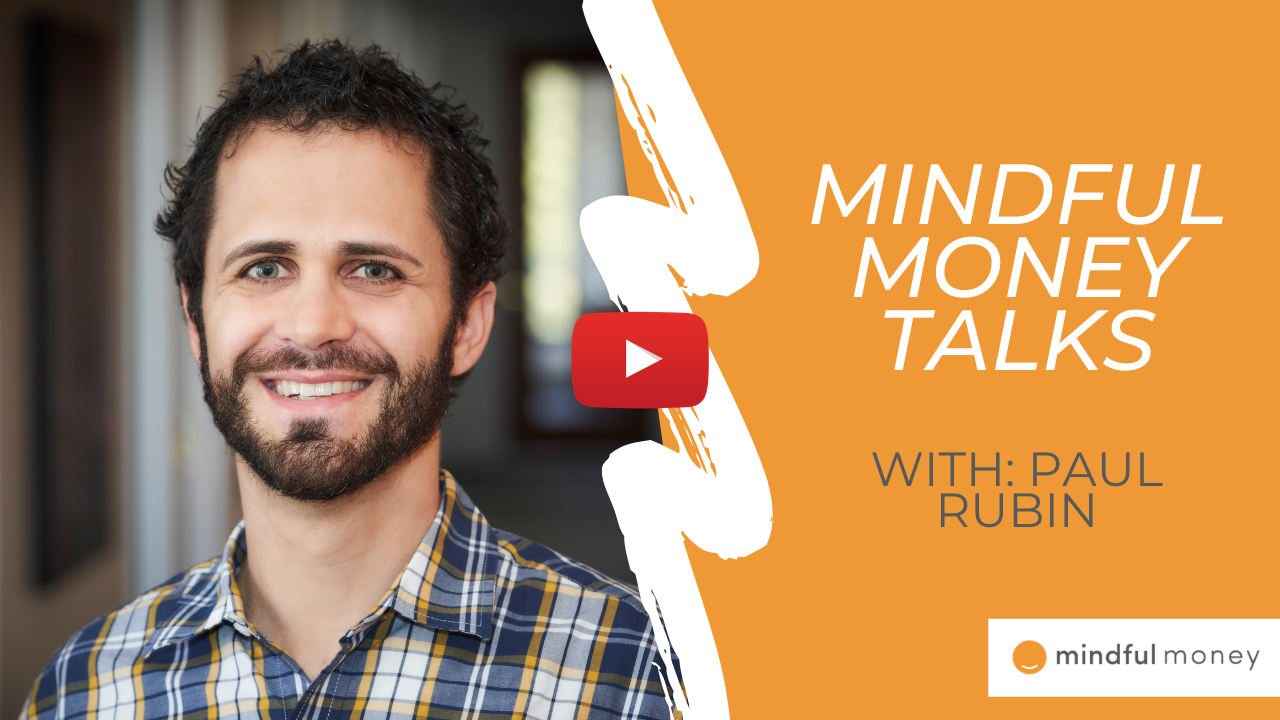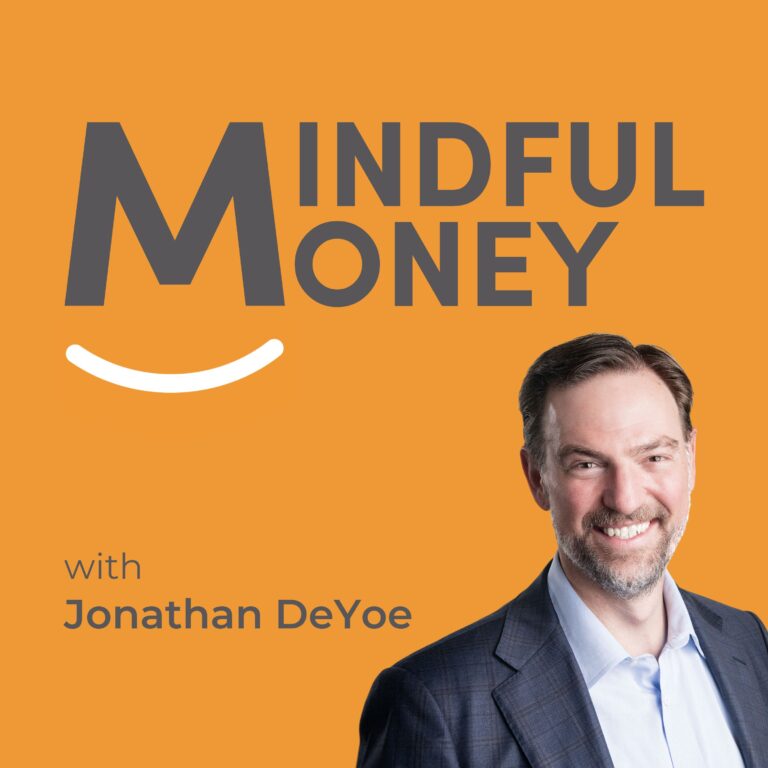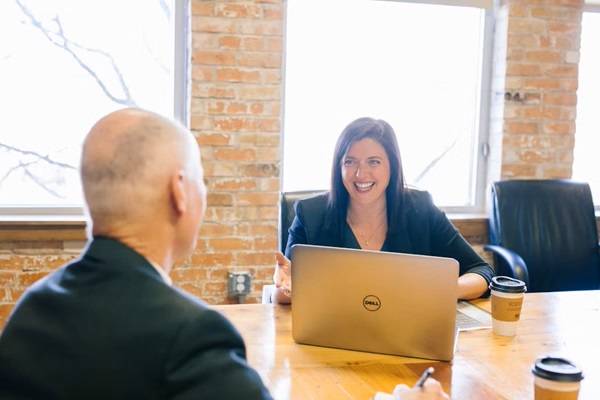Meet Paul Rubin, a financial planner at Mindful Money. In this interview, Paul talks about what mindfulness means to him and his experience at Mindful Money.
Money is powerful. It can both add to and detract from all areas of our lives. But human nature puts us at risk of making irrational financial choices. Today we are talking with financial planner Paul Rubin from Mindful Money who explains how to develop a better relationship with money by addressing the psychological, physiological, and cultural pressures that influence our choices.
This is part one of the series interviewing the whole Mindful Money team to get to know the team and hear their thoughts on being Mindful with your Money.
FULL TRANSCRIPT
Alessandra Illarramendi: Hello Mindful Money planners and happiness seekers, we are sitting down with Paul Rubin, who is a financial planner at Mindful Money. Paul has over seven years of experience in the finance industry and he is here to talk about his experience and his time in mindful money. Hi, Paul!
Paul Rubin: Hi, how are you doing Alessandra?
Alessandra Illarramendi: I’m good, I’m good. Before we get into all the good stuff, we do want to get to know you better so we thought about starting with some ice breaker questions.
Paul Rubin: Sure.
Introduction
Alessandra Illarramendi: So, tell us a little bit more about yourself.
Paul Rubin: I grew up in Houston, Texas and went to school in upstate New York, and then that’s where I met my partner and moved to the West Coast, so you can say I’ve been all around the country and now I’ve settled here in the Bay Area and love it a lot. I am happy and have a growing family, I love what I do and happy to be at Mindful Money and continue my career and my life.
Alessandra Illarramendi: Yeah, that’s really important, having a passion for what you are doing and for your life. What’s one thing most people don’t know about you?
Paul Rubin: So, there’s a time right probably like 20 years ago when poker was really popular, I was a part of that with my friends because I was, you know, an adolescent in my college years, when it was popular for young men and I was very into it. I played online poker and that’s how I paid off my student loans.
Alessandra Illarramendi: If you could be an animal which one would you choose and why?
Paul Rubin: I guess I would be like any type of bird. Just the idea of flying somewhere is cool, to feel free and go as you please. I imagine it’s probably tiring to fly, but I’d be all for it. Just to escape to anywhere you want to or go anywhere you want to.
Alessandra Illarramendi: Yeah, definitely, flying high. If you had to create a slogan for your life, what would it be?
Paul Rubin: My partner would say, she knows it about me I don’t like cliches or coming up with those kinds of things, but, if I had to come up with something, I don’t know what the slogan would be, or what a famous slogan is, but something about how you can’t go around or avoid things- you have to go through things if you want to get to where you want to go. So something along the lines of that.
Alessandra Illarramendi: That sounds good! And three words that would best describe you.
Paul Rubin: Caring, smart, and stubborn.
Alessandra Illarramendi: Okay, that sounds good. So this is just one more ice breaker question and then we can go in with your wisdom and experience. So before we get into that, what’s something that everyone seems to love but you don’t understand why they love it?
Paul Rubin: I think a lot of people like, at least that I perceive are loving, attention, and social media and putting themselves out there. I don’t understand that. I don’t like putting myself out there or being on social media or wanting attention.
Alessandra Illarramendi: So you would say you are a little more private?
Paul Rubin: Yeah, I like attention but not from anybody. I don’t want it from the whole world, I want it from just people I care about.
Wisdom and Experience
Alessandra Illarramendi: So now we can move on to the wisdom and experience aspect of this interview. What’s one thing you wish you had known when you began your career?
Paul Rubin: I think I wish I knew more intricacies of the kind of firms and places you can work at and what that entailed. I wish I knew more about that. What I mean about that, is there is a big divide in the industry around philosophy around investing and how to invest. And I think that kind of divides that and there are also business models too, and I didn’t know that as much going into it, I learned it as I went. So I wish I knew more about that and kind of what my personality type and what I was trying to accomplish were that fit. So I could just skip all the stuff that I didn’t want, and get to where I wanted to be.
Alessandra Illarramendi: What advice would you give to someone trying to pursue a career similar to yours?
Paul Rubin: I guess everybody does what they want to do for different reasons. But if they truly wanted to find something that they were passionate about and enjoy, I would want to know what that was and kind of tell them how this satisfies that desire and that need to get it out of their career. I would speak to that and tell them what’s rewarding and what’s tough and all the pros and cons of that. I guess, on a very personal level, I would talk to that person about what was for them and what they’re trying out of it and if this does or doesn’t meet that.
Alessandra Illarramendi: Definitely, If you are doing what you love, then you are always going to be happy. What is one common myth about your profession or field that you want to debunk?
Paul Rubin: Not everybody is as slimy as they are made out to be. There are some good people who have good intentions, and there are some bad apples but they hurt the reputation just like any other field.
Alessandra Illarramendi: What would you say is the thing you like most about your work?
Paul Rubin: I think the thing I like the most, is a combination of being analytical and mathematical, but also like the soft skills of working with people and how do you bridge those two things together and help people make use of that to make their life better or meaningful or more comfortable. So I think there’s something about that and how to work with people with all the complexities.
Alessandra Illarramendi: Is there a particular story in your profession that has touched your heart? Tell me about that and how that changed your work.
Paul Rubin: I don’t know if there is one that sticks out of my mind, but I will say, we actually just had a call yesterday, which symbolizes this experience that I have a lot with clients. When it comes to people’s finances there’s a lot of avoidance at wanting to look at what you’re earning, what you’re spending and like how are things going to work and I think when people finally face that fear and want to meet with somebody to get help to see that fear come up but then realize like, oh here’s where I’m at and this is what I need to do. Seeing that fear dissipate over time, through the interactions and the meetings that we have, that’s what I get the most out of, that’s what’s most gratifying.
We had it yesterday with somebody who was, even during the course of our meeting they were terrified, and they just wanted to know if they were going to be okay and we were like yes and no, but here are some things that you can do to make it better. She was still anxious but knowing that we are on her side, and here, I think she was feeling hopeful for a sight that things can be okay. So just that experience of helping people face their fears and not be avoidant of finances and knowing that someone is there to help them through that. That’s what’s most gratifying for me.
Alessandra Illarramendi: Yeah, It must be very rewarding to be able to have people’s back and help them surpass those fears that go along the way. What would you advise to someone who is starting to plan their finances?
Paul Rubin: I’d say if it feels comfortable to procrastinate and avoid these things. Just know that in the short run it’s going to feel good, but in the long run, it’s going to fester and be a problem. It’s better to start early and face these things head-on and acknowledge that you might not know everything and that is okay, and that’s why you have people or resources you can look into.
I think people feel like they need to know everything or if they don’t know they are stupid and they just avoid it right. So I think just knowing that that’s common and normal to feel that way, they should just push through it and seek the help you should get. Because I think a big mission for Mindful Money, and I’m not trying to act like a plug for Mindful Money, but just for my own self, I don’t think I was taught these things ever, and so, most people are not financially literate when it comes to how to navigate the complex systems that we have in terms of taxes and investments, and so forth, to optimize your financial situation. So, I think just, you know, facing it head-on, not being in denial about it not procrastinating, and seeking help and having some humility around that too.
Alessandra Illarramendi: So starting this new year, what are some specific roadblocks to watch out for 2021?
Paul Rubin: Well, 2020 was a crazy year and there are a lot of things that the government did to make things easier. So, for example, if you are retired you don’t have to take what is called a requirement of distribution, but this year you might. So there’s going to be some things that the government was, stimulus checks for and things to help, we don’t know if that’s going to happen this year and continue, it might. But we need to assume that it won’t. And then with that, you know, as Joe Biden becomes president and the senate is now a democratic majority, there might be some changes to the tax code.
So I think you just plan as if things you are not going to get as much support from the government, for now, you probably will at some point, and then also know that the tax code could change and you could end up paying more taxes at some point so just being aware of those things, not assuming that 2021 is going to be the same leniency we got in 2020.
Alessandra Illarramendi: Yeah, thank you. How do you think disciplined behaviors can have a long-term impact on a person’s life?
Paul Rubin: Well if we are going to talk specifically about financial planning, the biggest thing you can be disciplined about is things that you can control, which is how much you earn and how much you spend and save. The one that is hardest to change is usually income, I think because you have to work hard, get yourself employed or get a job – but I think cutting expenses is probably the easier one, in my experience. So being disciplined about that and saving is very important because- it’s a buzzword in the industry about compounded interest and compounded return, so, the more you can save sooner the more that compounds and grows on itself over time. So that discipline really shows up over long periods of time, you know, saving for retirement or whatever it is that you are saving for as soon as possible.
Alessandra Illarramendi: Okay and before we begin talking about mindful money, I just wanted to ask you one last question, what should I ask you that I didn’t know enough to ask?
Paul Rubin: I mean I guess what I’m thinking of, this profession, this industry, given that I said not all of us are bad and that is perception. How is it that you know that someone is in your best internist and how do I know who to go for help for? I think a lot of fear is that people don’t trust people in this industry, but yet they are between rock and hard place not wanting to face their finances and not knowing who to go to help for if they do realize that they need help. So I think, how do I know who to go to? When I make that decision that I want to and how do I know who to trust. That’s a good question to ask and try to figure out as you are seeking help in this area.
Alessandra Illarramendi: What would you recommend in that case, how could I know?
Paul Rubin: That’s a hard question, I think part of it is trusting your intuition and gut when it comes to meeting people. But I think a big thing- what we subscribe to is, you know, making sure you find someone who is fiduciary. There are two big standards in the industry; there’s one called suitability, there’s one called fiduciary. Suitability standard says as long as you can prove these things are good enough for a person’s circumstances, you can sell the product. The fiduciary standard is different though, it’s not saying as long as you do whatever it is, but it actually has to be in their best interest. So if there are multiple options we have to find the best option for the client, even if it goes in the way of our interest as an advisor.
So, that’s one big thing, and then another thing is talking – you’ll hear our philosophy in terms of investments and you’ll hear about other people’s philosophy and making sure those things align and getting an intuitive response of like, can I trust this person, do they really seem like they are giving good advice and looking out for me. If you don’t get that sense and are trying to sell something and make it more transactional then you know your answer, if it doesn’t feel right then look for someone else.
Working at Mindful Money
Alessandra Illarramendi: Now we are going to move into a couple of questions regarding your work and Mindful Money. So, how did you become a part of the Mindful Money team?
Paul Rubin: So I was working at a Financial Technology company, or they call it FinTech company, that actually went out of business. They were trying to create a model called a subscription model where they were doing financial planning for people and it just didn’t work out, the company ended up going out of business. The consumer is not ready for that model yet, in a way that we were trying to produce it. So I was out of work for a bit and I had actually heard of the founder, Jonathan K. DeYoe, because when I had gotten into the industry about 7 or 8 years ago around 2013 or so, I did some influential interviewing or local financial planners and advisers and I spoke to Jonathan he’s one of the four people and he gave me some advice but he wasn’t hiring at the time he was much smaller, and I saw that they posted a position soon after our company went out of business, and I was like, oh that’s cool. He’s one of the people that I’ve spoken to, and we hit it off again and all the things that I was looking for in terms of philosophy and being down to earth good people all aligned and I really saw a potential long term future. So I joined back in November of 2019 and I’m excited about the process of our future and I’ve enjoyed it ever since.
Alessandra Illarramendi: What is your current role at Mindful Money?
Paul Rubin: My current role, my title is a planner and what that means is, I work with the wealth advisors, so we have teams of two, well we are a big collective team, but we work in teams of two when we work with clients so I do a lot of the planning discussions and doing all the stuff with the financial plans whereas the wealth manager or wealth advisor might do more of the conversations around investments, but we still do that together, but we take more responsibilities in those areas when it comes to working with clients.
Alessandra Illarramendi: What does being mindful of your money and financial planning mean to you?
Paul Rubin: What’s most important about the philosophy, in my opinion, is that you know, there is this perception in investments that you are supposed to beat the market and you are supposed to predict what’s going to happen next. If I had known Amazon is going to be where it is today I would have invested years twenty years ago. We don’t know these things, and I think it’s so easy to say in hindsight what we should have done, and these are all biases that we have right because it’s so easy to say in hindsight what that is.
So, we flip that on its head and we say well don’t know what’s going to happen in the future and what company to pick, but what we do know based on research is that over long periods of time here is how you do grow your money and that is being globally diversified and owning the whole market. Now, given that context, you know, the mindfulness comes in then because now we are looking at the markets and saying the markets can go up and down but ultimately go up. How do we, instead of being fearful of the downs and trying to avoid them, let’s instead try to embrace them. So when you embrace them, what do you need to do? You have to be mindful of your emotions. Because when you go through ups and downs, more so the downs, you’re going to get very fearful and afraid and want to be impulsive and do something, you know, which is: sell when you shouldn’t sell. Then reversely when things are doing well, you might get really greedy and you might want to buy more when you shouldn’t.
So it’s recognizing and noticing those emotions and not necessarily acting on them and translating that into behavior that’s going to be destructive to your financial future. The mindfulness comes in because you are saying; I’m noticing this, I’m noticing that I have a plan in place, I know the research and data. So it’s taking things out of the medulla and bringing them into the prefrontal cortex and helping you think rationally while you are still having that emotional experience.
Alessandra Illarramendi: What advice would you give to someone who wants to be more mindful with their finances and how do you think these choices can lead to happiness as an outcome?
Paul Rubin: Well one, I think mindfulness has a stigma that it’s like, oh you have to be a person that is into yoga and do all of this new age stuff, I don’t think that is naturally the case. I think when we are talking about mindfulness we are speaking in a very distinct way of just being aware of your experience and not necessarily having an experience and having to act on that. So I think that’s an important thing just to note first of all.
Second of all, the way we are speaking about investments and how we see finances and how we perceive it aligns with yours or you can be convinced of it because, you know, we think it the best way to go, then now we can go into the step of like alright here’s how we are going to invest and then now let’s start practicing – this is something that we help our clients with the coaching around it, but like just noticing what’s coming up for you and not necessarily wanting to react, so having a delay of when you have an experience and from that and when you act. And then you gain support around that and if you need support you talk to people and you get insights and it helps you stay back in the prefrontal cortex of your mind, as opposed to, you know, being emotional and reacting and so forth.
It’s not just applicable to your finances but this can be applicable to your life, it helps bring more happiness because you are not now being so reactive and then creating destruction in other ways whether it is in relationships or your jobs or so forth. We believe that having the spaciousness to take a moment and reflect while you have that experience before you act, brings more contentment and happiness overall. Even though, within that experience, you can have multiple emotions that might not always be happy.
Alessandra Illarramendi: What is the biggest challenge you have with your specific role right now, and how are you going to overcome it?
Paul Rubin: I think the biggest challenge that we have, or at least in my role, is that we want to help everybody and, you know, we are also a business so how do you reconcile those two things? What I mean by that is, we have a model where we want to invest on people’s behalf and do financial planning so, if people don’t have money to manage, that is not how our business model is set up. So that is probably the biggest challenge we face as a firm.
But, what we are rolling out now is a digital platform to help people who can’t, you know, have money to be managed quite yet but can still get the help that they deserve. So I think that’s how we are trying to do that and well see how it goes, we are going to start in the next week or two, to be honest. We are getting people to sign up right now. So time will tell if people will take us up on it and want to do it, ‘cause it’s not going to be necessarily the same hand-holding, as in one on one relationship, but there is still going to be an element of interaction with us. So that’s I think the biggest challenge we have, cause we want to help everybody but we are also a business so we will see how 2021 takes us with that.
Alessandra Illarramendi: Yeah, it’s definitely going to be exciting! How do you continue to learn in order to stay on top of things within your role?
Paul Rubin: There is a prominent figure in the financial planning community. I’m part of his online platform, you know, constantly watching webinars and being in discussion channels and getting my – continuing my education credits. I’m going to the Financial Planning Association, their conference this summer, it’s called NorCal. I’m always reading things changing in the law, you have to keep yourself apprised of it because you know, if something were to change, for example, tax codes, that’s going to change the strategy of how we plan for that, so we have to be aware. We had prop19 pass recently and we had to be apprised of that because property taxes would increase if you transferred it to your children so after the fact, we were getting ahead of that and trying to tell clients here’s the deadline. So there are things always constantly changing there are things part of organizations that we are staying up to date with when it comes to investments and financial planning or anything. You want to be part of that community and know what best practices are and stay on top of things like that.
Alessandra Illarramendi: Excellent. As you know, there’s a lot going on in the world right now. What are you curious about now and why?
Paul Rubin: I think I’m most curious and slightly afraid of what’s going to happen to the fallout and transition of power in our government. Yeah, I’m afraid of the backlash and the violence and I speak more on a social level, not like an economic or financing level, yeah I’m afraid of people getting hurt or killed, to be honest. This feels very strange, this feels unprecedented to me. I’m most curious about how this is going to play out.
Alessandra Illarramendi: Thanks for sharing that, we just have one more question before our goodbye. In your own words, what does the phrase “mindfulness is a doorway to more rational choices” mean to you?
Paul Rubin: I kind of alluded to, or talked about it earlier but like when you are having an emotional experience it’s hard to be, I’m not trying to down- I think having an emotional experience is important, so I don’t think it’s a bad thing. But when you are making decisions that are very important, it’s not always best to be in that space so I think mindfulness helps you notice the emotions and be okay with them, but then, not dictate how you make decisions and choices in life. So then, you can get back into the thinking part of your brain to make those more rational choices.
Alessandra Illarramendi: Well, thank you, with that, we finish our round of questions. I really want to thank Paul for joining us today and for sharing his expertise. Thank you, Paul.
Paul Rubin: Yeah, thank you!
Alessandra Illarramendi: We hope to see you soon so you can meet our new and our next guest and always remember to stop predicting, start planning, and stay mindful. Until next time!
Takeaways
Paul touches on mindfulness being a doorway to more rational choices. Mindfulness, understanding the now with a non-judgmental awareness, helps us switch our brain to block out our emotions and the emphasis on “beating the market”, these behaviors can have long-term impacts on our careers and also personal lives.
Ready to learn more about being mindful of your money? Contact us here to get started!






